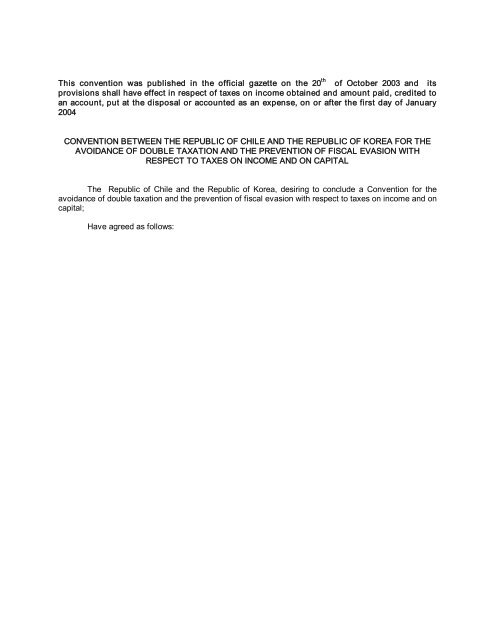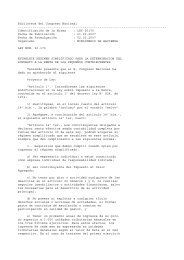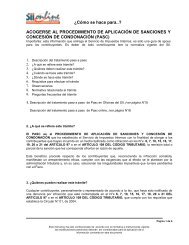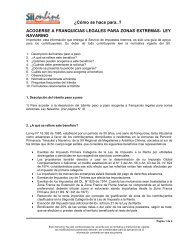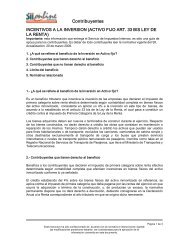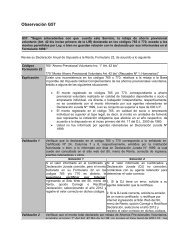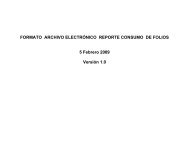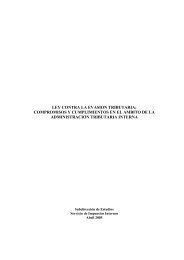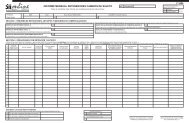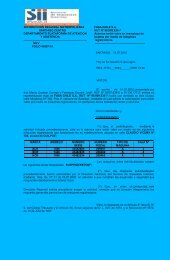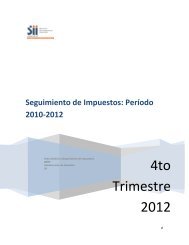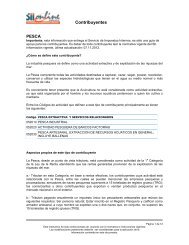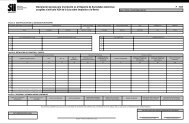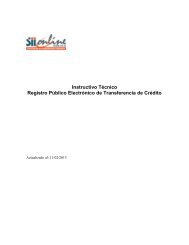Chile-Korea
Chile-Korea
Chile-Korea
Create successful ePaper yourself
Turn your PDF publications into a flip-book with our unique Google optimized e-Paper software.
This convention was published in the official gazette on the 20 th of October 2003 and itsprovisions shall have effect in respect of taxes on income obtained and amount paid, credited toan account, put at the disposal or accounted as an expense, on or after the first day of January2004CONVENTION BETWEEN THE REPUBLIC OF CHILE AND THE REPUBLIC OF KOREA FOR THEAVOIDANCE OF DOUBLE TAXATION AND THE PREVENTION OF FISCAL EVASION WITHRESPECT TO TAXES ON INCOME AND ON CAPITALThe Republic of <strong>Chile</strong> and the Republic of <strong>Korea</strong>, desiring to conclude a Convention for theavoidance of double taxation and the prevention of fiscal evasion with respect to taxes on income and oncapital;Have agreed as follows:
CHAPTER ISCOPE OF THE CONVENTIONArticle 1PERSONS COVEREDStates.This Convention shall apply to persons who are residents of one or both of the ContractingArticle 2TAXES COVERED1. This Convention shall apply to taxes on income and on capital imposed on behalf of aContracting State or of its political subdivisions or local authorities, irrespective of the manner in whichthey are levied.2. There shall be regarded as taxes on income and on capital all taxes imposed on total income, ontotal capital, or on elements of income or of capital, including taxes on gains from the alienation ofmovable or immovable property, taxes on the total amounts of wages or salaries paid by enterprises, aswell as taxes on capital appreciation.3. The existing taxes to which the Convention shall apply are, in particular:(a)(b)in <strong>Chile</strong>, the taxes imposed under the Income Tax Act, “Ley sobre Impuesto a la Renta”(hereinafter referred to as “<strong>Chile</strong>an tax”); andin <strong>Korea</strong>,(i)(ii)(iii)(iv)the income tax;the corporation tax;the special tax for rural development, andthe inhabitant tax;(hereinafter referred to as “ <strong>Korea</strong>n tax”).4. The Convention shall apply also to any identical or substantially similar taxes and to taxes oncapital which are imposed after the date of signature of the Convention in addition to, or in place of, theexisting taxes. At the end of each year, the competent authorities of the Contracting States shall notifyeach other of any significant changes which have been made in their respective taxation laws.
CHAPTER IIDEFINITIONSArticle 3GENERAL DEFINITIONS1. For the purposes of this Convention, unless the context otherwise requires:(a)(b)(c)(d)(e)(f)the terms “a Contracting State” and “the other Contracting State” mean, as the contextrequires, the Republic of <strong>Chile</strong> or the Republic of <strong>Korea</strong>, hereinafter “<strong>Chile</strong>” or “<strong>Korea</strong>”,respectively;the term "person" includes an individual, a company and any other body of persons;the term "company" means any body corporate or any entity that is treated as a bodycorporate for tax purposes;the terms "enterprise of a Contracting State" and "enterprise of the other ContractingState" mean respectively an enterprise carried on by a resident of a Contracting Stateand an enterprise carried on by a resident of the other Contracting State;the term "international traffic" means any transport by a ship or aircraft except whensuch transport is solely between places in a Contracting State;the term "competent authority" means:(i)(ii)in <strong>Chile</strong>, the Minister of Finance or his authorised representative, andin <strong>Korea</strong>, the Minister of Finance and Economy or his authorised representative;(g)the term "national" means:(i)(ii)any individual possessing the nationality of a Contracting State;any legal person or association deriving its status as such from the laws in forcein a Contracting State.2. As regards the application of the Convention at any time by a Contracting State, any term notdefined therein shall, unless the context otherwise requires, have the meaning that it has at that timeunder the law of that State for the purposes of the taxes to which the Convention applies, any meaningunder the applicable tax laws of that State prevailing over a meaning given to the term under other lawsof that State.
Article 4RESIDENT1. For the purposes of this Convention, the term "resident of a Contracting State" means anyperson who, under the laws of that State, is liable to tax therein by reason of his domicile, residence,place of management, place of incorporation, place of head or main office, or any other criterion of asimilar nature, and also includes that State and any political subdivision or local authority thereof. Thisterm, however, does not include any person who is liable to tax in that State in respect only of incomefrom sources in that State, or of capital situated there in.2. Where by reason of the provisions of paragraph 1 an individual is a resident of both ContractingStates, then his status shall be determined as follows:(a)(b)(c)(d)he shall be deemed to be a resident only of the State in which he has a permanent homeavailable to him; if he has a permanent home available to him in both States, he shall bedeemed to be a resident only of the State with which his personal and economicrelations are closer (centre of vital interests);if the State in which he has his centre of vital interests cannot be determined, or if hehas not a permanent home available to him in either State, he shall be deemed to be aresident only of the State in which he has an habitual abode;if he has an habitual abode in both States or in neither of them, he shall be deemed tobe a resident only of the State of which he is a national;if he is a national of both States or of neither of them, the competent authorities of theContracting States shall settle the question by mutual agreement procedure.3. Where by reason of the provisions of paragraph 1 a person other than an individual is a residentof both Contracting States, the competent authorities of the States shall endeavour to settle the questionby mutual agreement having regard to its place of effective management, the place of main or headoffice, place of incorporation, or any other relevant factors. In the absence of such agreement, suchperson shall not be entitled to any benefits under this Convention, except that such person may claim thebenefits of Articles 24 (Nondiscrimination) and 25(Mutual agreement procedure).Article 5PERMANENT ESTABLISHMENT1. For the purposes of this Convention, the term "permanent establishment" means a fixed place ofbusiness through which the business of an enterprise is wholly or partly carried on.2. The term "permanent establishment" includes especially:(a)(b)a place of management;a branch;
(c)(d)(e)(f)an office;a factory;a workshop; anda mine, an oil or gas well, a quarry or any other place relating to the exploration for orextraction of natural resources.3. The term “permanent establishment” shall also include:(a)(b)a building site or construction or installation project and the supervisory activities inconnection therewith, but only if such building site, construction or activities last morethan six months, andthe furnishing of services, including consultancy services, by an enterprise throughemployees or other individuals engaged by the enterprise for such purpose, but onlywhere such activities continue within the country for a period or periods aggregatingmore than 183 days within any twelve month period.For the purposes of computing the time limits in this paragraph, activities carried on by anenterprise associated with another enterprise within the meaning of Article 9 of this Convention shall beaggregated with the period during which activities are carried on by the enterprise if the activities of theassociated enterprises are substantially the same.4. Notwithstanding the preceding provisions of this Article, the term "permanent establishment"shall be deemed not to include:(a)(b)(c)(d)(e)the use of facilities solely for the purpose of storage, display or delivery of goods ormerchandise belonging to the enterprise;the maintenance of a stock of goods or merchandise belonging to the enterprise solelyfor the purpose of storage, display or delivery;the maintenance of a stock of goods or merchandise belonging to the enterprise solelyfor the purpose of processing by another enterprise;the maintenance of a fixed place of business solely for the purpose of purchasing goodsor merchandise or of collecting information, for the enterprise;the maintenance of a fixed place of business solely for the purpose of advertising,supplying information or carrying out scientific research or any other activity of a similarnature for the enterprise, if such activity is of a preparatory or auxiliary character.5. Notwithstanding the provisions of paragraphs 1 and 2, where a person (other than an agent of anindependent status to whom paragraph 6 applies) is acting on behalf of an enterprise and has, andhabitually exercises, in a Contracting State an authority to conclude contracts in the name of theenterprise, that enterprise shall be deemed to have a permanent establishment in that State in respect ofany activities which that person undertakes for the enterprise, unless the activities of such person arelimited to those mentioned in paragraph 4 which, if exercised through a fixed place of business, wouldnot make this fixed place of business a permanent establishment under the provisions of that paragraph.
6. An enterprise shall not be deemed to have a permanent establishment in a Contracting Statemerely because it carries on business in that State through a broker, general commission agent or anyother agent of an independent status, provided that such persons are acting in the ordinary course oftheir business. However, when such agents are acting wholly or almost wholly on behalf of the enterprisethey shall not be considered agents of an independent status within the meaning of this paragraph.7. The fact that a company which is a resident of a Contracting State controls or is controlled by acompany which is a resident of the other Contracting State, or which carries on business in that otherState (whether through a permanent establishment or otherwise), shall not of itself constitute eithercompany a permanent establishment of the other.CHAPTER IIITAXATION OF INCOMEArticle 6INCOME FROM IMMOVABLE PROPERTY1. Income derived by a resident of a Contracting State from immovable property (including incomefrom agriculture or forestry) situated in the other Contracting State may be taxed in that other State.2. The term "immovable property" shall have the meaning which it has under the law of theContracting State in which the property in question is situated. The term shall in any case includeproperty accessory to immovable property, livestock and equipment used in agriculture and forestry,rights to which the provisions of general law respecting landed property apply, usufruct of immovableproperty and rights to variable or fixed payments as consideration for the working of, or the right to work,mineral deposits, sources and other natural resources; ships and aircraft shall not be regarded asimmovable property.3. The provisions of paragraph 1 shall apply to income derived from the direct use, letting, or use inany other form of immovable property.4. The provisions of paragraphs 1 and 3 shall also apply to the income from immovable property ofan enterprise and to income from immovable property used for the performance of independent personalservices.Article 7BUSINESS PROFITS1. The profits of an enterprise of a Contracting State shall be taxable only in that State unless theenterprise carries on business in the other Contracting State through a permanent establishment situatedtherein. If the enterprise carries on or has carried on business as aforesaid, the profits of the enterprisemay be taxed in the other State but only so much of them as is attributable to that permanentestablishment.
2. Subject to the provisions of paragraph 3, where an enterprise of a Contracting State carries onbusiness in the other Contracting State through a permanent establishment situated therein, there shall ineach Contracting State be attributed to that permanent establishment the profits which it might beexpected to make if it were a distinct and separate enterprise engaged in the same or similar activitiesunder the same or similar conditions and dealing wholly independently with the enterprise of which it is apermanent establishment.3. In determining the profits of a permanent establishment, there shall be allowed as deductionsnecessary expenses which are incurred for the purposes of the permanent establishment, includingexecutive and general administrative expenses so incurred, whether in the State in which the permanentestablishment is situated or elsewhere.4. No profits shall be attributed to a permanent establishment by reason of the mere purchase bythat permanent establishment of goods or merchandise for the enterprise.5. For the purposes of the preceding paragraphs, the profits to be attributed to the permanentestablishment shall be determined by the same method year by year unless there is good and sufficientreason to the contrary.6. Where profits include items of income which are dealt with separately in other Articles of thisConvention, then the provisions of those Articles shall not be affected by the provisions of this Article.Article 8SHIPPING AND AIR TRANSPORT1. Profits of an enterprise of a Contracting State from the operation of ships or aircraft ininternational traffic shall be taxable only in that State.2. The provisions of paragraph 1 shall also apply to profits from the participation in a pool, a jointbusiness or an international operating agency.Article 9ASSOCIATED ENTERPRISES1. Where(a)(b)an enterprise of a Contracting State participates directly or indirectly in the management,control or capital of an enterprise of the other Contracting State, orthe same persons participate directly or indirectly in the management, control or capitalof an enterprise of a Contracting State and an enterprise of the other Contracting State,and in either case conditions are made or imposed between the two enterprises in their commercial orfinancial relations which differ from those which would be made between independent enterprises, thenany profits which would, but for those conditions, have accrued to one of the enterprises, but, by reasonof those conditions, have not so accrued, may be included in the profits of that enterprise and taxed
accordingly.2. Where a Contracting State includes in the profits of an enterprise of that State and taxesaccordingly profits on which an enterprise of the other Contracting State has been charged to tax in thatother State and the profits so included are profits which would have accrued to the enterprise of thefirstmentioned State if the conditions made between the two enterprises had been those which wouldhave been made between independent enterprises, then that other State shall, if it agrees, make anappropriate adjustment to the amount of the tax charged therein on those profits. In determining suchadjustment, due regard shall be had to the other provisions of this Convention and the competentauthorities of the Contracting States shall if necessary consult each other.Article 10DIVIDENDS1. Dividends paid by a company which is a resident of a Contracting State to a resident of the otherContracting State may be taxed in that other State.2. However, such dividends may also be taxed in the Contracting State of which the company paying thedividends is a resident and according to the laws of that State, but if the beneficial owner of the dividends is aresident of the other Contracting State, the tax so charged shall not exceed:(a)(b)5 per cent of the gross amount of the dividends if the beneficial owner is a company thatcontrols directly or indirectly at least 25 per cent of the voting power in the company payingthe dividends, and10 per cent of the gross amount of the dividends, in all other cases.This paragraph shall not affect the taxation of the company in respect of the profits out of which thedividends are paid.Notwithstanding this paragraph, <strong>Chile</strong> is entitled to impose the first category tax and the additional taxunder <strong>Chile</strong>an tax law as long as the first category tax is deductible in computing the additional tax.3. The term "dividends" as used in this Article means income from shares or other rights, not beingdebtclaims, participating in profits, as well as income from other rights which is subjected to the sametaxation treatment as income from shares by the laws of the State of which the company making thedistribution is a resident.4. The provisions of paragraphs 1 and 2 shall not apply if the beneficial owner of the dividends,being a resident of a Contracting State, carries on business in the other Contracting State of which thecompany paying the dividends is a resident, through a permanent establishment situated therein, orperforms in that other State independent personal services from a fixed base situated therein, and theholding in respect of which the dividends are paid is effectively connected with such permanentestablishment or fixed base. In such case the provisions of Article 7 or Article 14, as the case may be,shall apply.5. Where a company that is a resident of a Contracting State derives profits or income from the
other Contracting State, that other State may not impose any tax on the dividends paid by the company,except insofar as such dividends are paid to a resident of that other State or insofar as the holding inrespect of which the dividends are paid is effectively connected with a permanent establishment or afixed base situated in that other State, nor subject the company's undistributed profits to a tax on thecompany’s undistributed profits, even if the dividends paid or the undistributed profits consist wholly orpartly of profits or income arising in such other State.Article 11INTEREST1. Interest arising in a Contracting State and paid to a resident of the other Contracting State maybe taxed in that other State.2. However, such interest may also be taxed in the Contracting State in which it arises andaccording to the laws of that State, but if the beneficial owner of the interest is a resident of theother Contracting State, the tax so charged shall not exceed:a) 10 per cent of the gross amount of interest derived from loans granted by banks andinsurance companies; andb) 15 per cent of the gross amount of the interest in all other cases.3. The term "interest" as used in this Article means income from debtclaims of every kind, whetheror not secured by mortgage, and in particular, income from government securities and income frombonds or debentures, as well as income which is subjected to the same taxation treatment as incomefrom money lent by the laws of the State in which the income arises. The term interest shall not includeincome dealt with in Article 10.4. The provisions of paragraphs 1 and 2 shall not apply if the beneficial owner of the interest, beinga resident of a Contracting State, carries on business in the other Contracting State in which the interestarises through a permanent establishment situated therein, or performs in that other State independentpersonal services from a fixed base situated therein, and the debtclaim in respect of which the interest ispaid is effectively connected with such permanent establishment or fixed base. In such case theprovisions of Article 7 or Article 14 of this Convention, as the case may be, shall apply.5. Interest shall be deemed to arise in a Contracting State when the payer is a resident of thatState. Where, however, the person paying the interest, whether he is a resident of a Contracting State ornot, has in a Contracting State a permanent establishment or a fixed base in connection with which theindebtedness on which the interest is paid was incurred, and such interest is borne by such permanentestablishment or fixed base, then such interest shall be deemed to arise in the State in which thepermanent establishment or fixed base is situated.6. Where, by reason of a special relationship between the payer and the beneficial owner orbetween both of them and some other person, the amount of the interest, having regard to the debtclaim
for which it is paid, exceeds the amount which would have been agreed upon by the payer and thebeneficial owner in the absence of such relationship, the provisions of this Article shall apply only to thelastmentioned amount. In such case, the excess part of the payments shall remain taxable according tothe laws of each Contracting State, due regard being had to the other provisions of this Convention.7. The provisions of this Article shall not apply if it was the main purpose or one of the mainpurposes of any person concerned with the creation or assignment of the debtclaim in respect of whichthe interest is paid to take advantage of this Article by means of that creation or assignment.Article 12ROYALTIES1. Royalties arising in a Contracting State and paid to a resident of the other Contracting State maybe taxed in that other State.2. However, such royalties may also be taxed in the Contracting State in which they arise andaccording to the laws of that State, but if the beneficial owner of the royalties is a resident of the otherContracting State, the tax so charged shall not exceed:(a)(b)5 per cent of the gross amount of such royalties which are paid for the use of, or the rightto use, industrial, commercial or scientific equipment; and15 per cent of the gross amount of such royalties in all other cases.3. The term "royalties" as used in this Article means payments of any kind received as aconsideration for the use of, or the right to use, any copyright of literary, artistic or scientific work,including cinematographic films, any patent, trade mark, design or model, plan, secret formula orprocess, or other intangible property, or for the use of, or the right to use, industrial, commercial orscientific equipment, or for information concerning industrial, commercial or scientific experience.4. The provisions of paragraphs 1 and 2 of this Article shall not apply if the beneficial owner of theroyalties, being a resident of a Contracting State, carries on business in the other Contracting State inwhich the royalties arise, through a permanent establishment situated therein, or performs in that otherState independent personal services from a fixed base situated therein, and the right or property inrespect of which the royalties are paid is effectively connected with such permanent establishment orfixed base. In such case the provisions of Article 7 or Article 14, as the case may be, shall apply.5. Royalties shall be deemed to arise in a Contracting State when the payer is a resident of thatState. Where, however, the person paying the royalties, whether a resident of a Contracting State or not,has in a Contracting State a permanent establishment or a fixed base in connection with which theobligation to pay the royalties was incurred, and such royalties are borne by such permanentestablishment or fixed base, then such royalties shall be deemed to arise in the State in which thepermanent establishment or fixed base is situated.
6. Where, by reason of a special relationship between the payer and the beneficial owner orbetween both of them and some other person, the amount of the royalties having regard to the use, rightor information for which they are paid, exceeds the amount which would have been agreed upon by thepayer and the beneficial owner in the absence of such relationship, the provisions of this Article shallapply only to the lastmentioned amount. In such case, the excess part of the payments shall remaintaxable according to the laws of each Contracting State, due regard being had to the other provisions ofthis Convention.7. The provisions of this Article shall not apply if it was the main purpose or one of the mainpurposes of any person concerned with the creation or assignment of the rights in respect to which theroyalties are paid to take advantage of this Article by means of that creation or assignment.Article 13CAPITAL GAINS1. Gains derived by a resident of a Contracting State from the alienation of immovable propertyreferred to in Article 6 and situated in the other Contracting State may be taxed in that other State.2. Gains from the alienation of movable property forming part of the business property of apermanent establishment which an enterprise of a Contracting State has in the other Contracting State orof movable property pertaining to a fixed base available to a resident of a Contracting State in the otherContracting State for the purpose of performing independent personal services, including such gainsfrom the alienation of such a permanent establishment (alone or with the whole enterprise) or of such afixed base, may be taxed in that other State.3. Gains derived by a resident of a Contracting State from the alienation of ships or aircraftoperated in international traffic or movable property pertaining to the operation of such ships or aircraftshall be taxable only in that Contracting State.4. Gains derived by a resident of a Contracting State from the alienation of shares or other rightsrepresenting the capital of a company that is a resident of the other Contracting State may be taxed inthat other Contracting State if,a) the assets of the company consists or consisted, directly or indirectly, principally ofimmovable property referred to in Article 6 and situated in that other Contracting State; orb) the recipient of the gain at any time during the 12month period preceding such alienationowned, directly or indirectly, shares or other rights consisting of 20 percent or more of thecapital of that company.Any other gains derived by a resident of Contracting State from the alienation of shares or otherrights representing the capital of a company resident in the other Contracting State may also be taxed inthat other Contracting State but the tax so charged shall not exceed 20 percent of the amount of thegain.5. Gains from the alienation of any other property other than that referred to in the precedingparagraphs of this Article shall be taxable only in the Contracting State in which the alienator is aresident
Article 14INDEPENDENT PERSONAL SERVICES1. Income derived by an individual who is a resident of a Contracting State in respect ofprofessional services or other activities of an independent character shall be taxable only in thatContracting State. However, such income may also be taxed in the other Contracting State:(a)(b)if he has a fixed base regularly available in the other Contracting State for purpose ofperforming the activities; in that case, only so much of the income as is attributable tothat fixed base may be taxed in that other State;if he is present in the other Contracting State for a period or periods amounting to orexceeding in the aggregate 183 days in any twelve month period; in that case, only somuch of the income as is derived from the activities performed in that other State maybe taxed in that State.2. The term "professional services" includes especially independent scientific, literary, artistic,educational or teaching activities as well as the independent activities of physicians, lawyers, engineers,architects, dentists and accountants.Article 15DEPENDENT PERSONAL SERVICES1. Subject to the provisions of Articles 16, 18 and 19, salaries, wages and other remunerationderived by a resident of a Contracting State in respect of an employment shall be taxable only in thatState unless the employment is exercised in the other Contracting State. If the employment is soexercised, such remuneration as is derived therefrom may be taxed in that other State.2. Notwithstanding the provisions of paragraph 1, remuneration derived by a resident of aContracting State in respect of an employment exercised in the other Contracting State shall be taxableonly in the firstmentioned State if:(a)(b)(c)the recipient is present in the other State for a period or periods not exceeding in theaggregate 183 days in any twelve months period commencing or ending in the fiscal yearconcerned, andthe remuneration is paid by, or on behalf of, a person being an employer who is not aresident of the other State, andthe remuneration is not borne by a permanent establishment or a fixed base which theperson being an employer has in the other State.3. Notwithstanding the preceding provisions of this Article, remuneration derived by a resident of aContracting State in respect of an employment exercised aboard a ship or aircraft operated ininternational traffic shall be taxable only in that State.
Article 16DIRECTORS' FEESDirectors' fees and other similar payments derived by a resident of a Contracting State in hiscapacity as a member of the board of directors or a similar organ of a company which is a resident of theother Contracting State may be taxed in that other State.Article 17ARTISTES AND SPORTSMEN1. Notwithstanding the provisions of Articles 14 and 15, income derived by a resident of aContracting State as an entertainer, such as a theatre, motion picture, radio or television artiste, or amusician, or as a sportsman, from his personal activities as such exercised in the other ContractingState, may be taxed in that other State.2. Where income in respect of personal activities exercised by an entertainer or a sportsman in hiscapacity as such accrues not to the entertainer or sportsman himself but to another person, that incomemay, notwithstanding the provisions of Articles 7, 14 and 15, be taxed in the Contracting State in whichthe activities of the entertainer or sportsman are exercised.Article 18PENSIONSPensions arising in a Contracting State and paid to a resident of the other Contracting State shallbe taxable only in the Contracting State in which they arise.Article 19GOVERNMENT SERVICE1. (a) Salaries, wages and other remuneration, other than a pension, paid by a ContractingState or a political subdivision or a local authority thereof to an individual in respect ofservices rendered to that State or subdivision or authority shall be taxable only in thatState.(b)However, such salaries, wages and other remuneration shall be taxable only in the otherContracting State if the services are rendered in that State and the individual is aresident of that State who:
(i)(ii)is a national of that State; ordid not become a resident of that State solely for the purpose of rendering theservices.2. The provisions of Articles 15, 16 and 17 shall apply to salaries, wages and other remuneration inrespect of services rendered in connection with a business carried on by a Contracting State or a politicalsubdivision or a local authority thereof.Article 20STUDENTSPayments which a student, apprentice or business trainee who is or was immediately beforevisiting a Contracting State a resident of the other Contracting State and who is present in thefirstmentioned State solely for the purpose of his education or training receives for the purpose of hismaintenance, education or training shall not be taxed in that State, provided that such payments arisefrom sources outside that State.Article 21OTHER INCOME1. Items of income of a resident of a Contracting State, wherever arising, not dealt with in theforegoing Articles of this Convention shall be taxable only in that State.2. The provisions of paragraph 1 shall not apply to income, other than income from immovable property asdefined in paragraph 2 of Article 6, if the recipient of such income, being a resident of a Contracting State,carries on business in the other Contracting State through a permanent establishment situated therein, orperforms in that other State independent personal services from a fixed base situated therein, and the right orproperty in respect of which the income is paid is effectively connected with such permanent establishment orfixed base. In such case the provisions of Article 7 or Article 14, as the case may be, shall apply.3.Notwithstanding the provisions of paragraphs 1 and 2, items of income of resident of a Contracting State not dealt with in the foregoing Articles of this Convention and arising in the other Contracting State may alsobe taxed in that other State.CHAPTER IVTAXATION OF CAPITALArticle 22CAPITAL1. Capital represented by immovable property owned by a resident of a Contracting State andsituated in the other Contracting State may be taxed in that other State.
2. Capital represented by movable property forming part of the business property of a permanentestablishment that an enterprise of a Contracting State has in the other Contracting State, or by movableproperty pertaining to a fixed base available to a resident of a Contracting State in the other ContractingState for the purpose of performing independent personal services, may be taxed in that other State.3. Capital represented by ships and aircraft operated in international traffic, and by movableproperty pertaining to the operation of such ships or aircraft, shall be taxable only in the ContractingState of which the enterprise operating such ships or aircraft is resident.4. All other elements of capital of a resident of a Contracting State shall be taxable only in thatState.CHAPTER VMETHODS FOR ELIMINATION OF DOUBLE TAXATIONArticle 23ELIMINATION OF DOUBLE TAXATION1. In <strong>Chile</strong>, double taxation shall, subject to the provisions of <strong>Chile</strong>an law regarding the eliminationof international double taxation (which shall not affect the general principle hereof), be eliminated asfollows:Residents in <strong>Chile</strong>, obtaining income which may in accordance with the provisions of thisConvention be subject to taxation in <strong>Korea</strong>, may credit the tax so paid against any <strong>Chile</strong>an tax payable inrespect of the same income; this paragraph shall apply to all income referred to in the Convention2. In <strong>Korea</strong>, double taxation shall, subject to the provisions of <strong>Korea</strong>n law regarding the allowanceas credit against <strong>Korea</strong>n tax of tax payable in any country other than <strong>Korea</strong> (which shall not affect thegeneral principle hereof), be eliminated as follows:(a) Where a resident of <strong>Korea</strong> derives income from <strong>Chile</strong> which may be taxed in <strong>Chile</strong> underthe laws of <strong>Chile</strong> in accordance with the provisions of this Convention, in respect of that income, theamount of <strong>Chile</strong>an tax payable shall be allowed as a credit against the <strong>Korea</strong>n tax payable imposed onthat resident. The amount of credit shall not, however, exceed that part of <strong>Korea</strong>n tax as computedbefore the credit is given, which is appropriate to that income;(b) Where the income derived from <strong>Chile</strong> is a dividend paid by a company which is aresident of <strong>Chile</strong> to a company which is a resident of <strong>Korea</strong> which owns not less than 10 per cent of thetotal shares issued by that company, the credit shall take into account the <strong>Chile</strong>an tax payable by thecompany in respect of the profits out of which such dividend is paid.3. Where in accordance with any provision of the Convention income derived or capital owned by aresident of a Contracting State is exempt from tax in that State, such State may nevertheless, incalculating the amount of tax on the remaining income or capital of such person, take into account theexempted income or capital.
CHAPTER VISPECIAL PROVISIONSArticle 24NONDISCRIMINATION1. Nationals of a Contracting State shall not be subjected in the other Contracting State to anytaxation or any requirement connected therewith, which is other or more burdensome than the taxationand connected requirements to which nationals of that other State in the same circumstances, inparticular with respect to residence, are or may be subjected. This provision shall, notwithstanding theprovisions of Article 1, also apply to persons who are not residents of one or both of the ContractingStates.2. The taxation on a permanent establishment which an enterprise of a Contracting State has in theother Contracting State shall not be less favourably levied in that other State than the taxation levied onenterprises of that other State carrying on the same activities.3. Nothing in this Article shall be construed as obliging a Contracting State to grant to residents ofthe other Contracting State any personal allowances, reliefs and reductions for taxation purposes onaccount of civil status or family responsibilities that it grants to its own residents.4. Except where the provisions of paragraph 1 of Article 9, paragraph 6 of Article 11, or paragraph6 of Article 12, apply, interest, royalties and other disbursements paid by an enterprise of a ContractingState to a resident of the other Contracting State shall, for the purpose of determining the taxable profitsof such enterprise, be deductible under the same conditions as if they had been paid to a resident of thefirstmentioned State.5. Companies of a Contracting State, the capital of which is wholly or partly owned or controlled,directly or indirectly, by one or more residents of the other Contracting State, shall not be subjected inthe firstmentioned State to any taxation or any requirement connected therewith which is other or moreburdensome than the taxation and connected requirements to which other similar companies of thefirstmentioned State are or may be subjected.6. In this Article, the term "taxation" means taxes that are the subject of this Convention.
Article 25MUTUAL AGREEMENT PROCEDURE1. Where a person considers that the actions of one or both of the Contracting States result or willresult for him in taxation not in accordance with the provisions of this Convention, he may, irrespective ofthe remedies provided by the domestic law of those States, present his case to the competent authorityof the Contracting State of which he is a resident or, if his case comes under paragraph 1 of Article 24, tothat of the Contracting State of which he is a national. The case must be presented within three yearsfrom the first notification of the action resulting in taxation not in accordance with the provisions of theConvention.2. The competent authority shall endeavour, if the objection appears to it to be justified and if it isnot itself able to arrive at a satisfactory solution, to resolve the case by a mutual agreement procedurewith the competent authority of the other Contracting State, with a view to the avoidance of taxationwhich is not in accordance with the Convention. Any agreement reached shall be implemented inaccordance with the domestic law of the Contracting States.3. The competent authorities of the Contracting States shall endeavour to resolve by mutualagreement procedure any difficulties or doubts arising as to the interpretation or application of theConvention.4. The competent authorities of the Contracting States may communicate with each other directly,for the purpose of reaching an agreement in the sense of the preceding paragraphs.Article 26EXCHANGE OF INFORMATION1. The competent authorities of the Contracting States shall exchange such information as isnecessary for carrying out the provisions of this Convention or of the domestic laws of the ContractingStates concerning taxes covered by the Convention insofar as the taxation thereunder is not contrary tothe Convention. The exchange of information is not restricted by Article 1. Any information received by aContracting State shall be treated as secret in the same manner as information obtained under thedomestic laws of that State and shall be disclosed only to persons or authorities (including courts andadministrative bodies) involved in the assessment or collection of, the enforcement or prosecution inrespect of, or the determination of appeals in relation to, the taxes covered by the Convention. Suchpersons or authorities shall use the information only for such purposes. They may disclose theinformation in public court proceedings or in judicial decisions.2. In no case shall the provisions of paragraph 1 be construed so as to impose on a ContractingState the obligation:(a)to carry out administrative measures at variance with the laws and the administrativepractice of that or of the other Contracting State;(b)to supply information which is not obtainable under the laws or in the normal course of
the administration of that or of the other Contracting State;(c)to supply information which would disclose any trade, business, industrial, commercial orprofessional secret or trade process, or information, the disclosure of which would becontrary to public policy (“ordre public”).3. If information is requested by a Contracting State in accordance with this Article, the otherContracting State shall obtain the information to which the request relates in the same way as if its owntaxation were involved even though the other State does not, at that time, need such information.Article 27MEMBERS OF DIPLOMATIC MISSIONS AND CONSULAR POSTSNothing in this Convention shall affect the fiscal privileges of members of diplomatic missions orconsular posts under the general rules of international law or under the provisions of special agreements.CHAPTER VIIFINAL PROVISIONSArticle 28ENTRY INTO FORCE1. The Governments of the Contracting States shall notify each other that the constitutionalrequirements for the entry into force of this Convention have been complied with. The Convention shallenter into force on the fifteenth day after the date of the later of the notifications.2. The provisions of this Convention shall have effect:(a)in <strong>Chile</strong>,in respect of taxes on income obtained and amounts paid, credited to an account, put at thedisposal or accounted as an expense, on or after the first day of January in the calendar yearnext following that in which this Convention enters into force.(b)in <strong>Korea</strong>,(i)(ii)in respect of taxes withheld at source, for amounts payable on or after the firstday of January in the first calendar year following that in which thisConvention enters into force; andin respect of other taxes, for the taxable year beginning on or after the firstday of January in the first calendar year following that in which thisConvention enters into force.
Article 29TERMINATION1. This Convention shall continue in effect indefinitely but either Contracting State may, on orbefore the thirtieth day of June of any calendar year beginning after the expiration of a period of fiveyears from the date of its entry into force, give to the other Contracting State a notice of termination inwriting through diplomatic channels.2. The provisions of this Convention shall cease to have effect:(a)in <strong>Chile</strong>,in respect of taxes on income obtained and amounts paid, credited to an account, put at thedisposal or accounted as an expense, on or after the first day of January in the calendar yearnext following that in which the notice is given; and(b)in <strong>Korea</strong>:(i)(ii)in respect of taxes withheld at source, for amounts payable on or after the firstday of January in the first calendar year following that in which the notice isgiven; andin respect of other taxes, for the taxable year beginning on or after the first dayof January in the first calendar year following that in which the notice is given.IN WITNESS WHEREOF, the undersigned, duly authorised thereto, have signed this Convention.DONE in duplicate at Seoul, this 18 th ° day of April, 2002, in the Spanish, <strong>Korea</strong>n, and Englishlanguages, all texts being equally authentic. In the case of divergence of interpretation, the English textshall prevail.FOR THE REPUBLIC OF CHILEFOR THE REPUBLIC OF KOREA
PROTOCOL TO THE CONVENTION BETWEENTHE REPUBLIC OF CHILEANDTHE REPUBLIC OF KOREAFOR THE AVOIDANCE OF DOUBLE TAXATION AND THE PREVENTION OF FISCALEVASIONWITH RESPECT TO TAXES ON INCOME AND ON CAPITALOn signing the Convention of the avoidance of double taxation and the prevention of fiscalevasion with respect to taxes on income and on capital between the Republic of <strong>Chile</strong> and the Republicof <strong>Korea</strong>, the undersigned have agreed that the following provisions shall form an integral part of theConvention.1. Ad Article 81) For the purposes of Article 8:(a)the term “profits” includes especially:(i)(ii)gross revenues derived directly from the operation of ships or aircraft ininternational traffic, andinterest over the amounts derived directly from the operation of ships or aircraftin international traffic, only if such interest is incidental to the operation.(b)the expression “operation of ships and aircraft” by an enterprise, also includes:(i)(ii)the charter or rental on a bareboat basis of ships and aircraft;the rental of containers and related equipment,if that charter or rental is incidental to the operation by the enterprise of ships or aircraftin international traffic.2) An enterprise of a Contracting State which operates ships or aircraft in international traffic in theother Contracting State shall be exempt from the value added tax or other similar tax in that otherContracting State on transport of goods or passengers.2. Ad Article 11If in any Agreement or Convention concluded by <strong>Chile</strong> with a third State, being a member of theOrganization for Economic Cooperation and Development, <strong>Chile</strong> would agree to reduce the rate orexemption of tax provided in paragraph 2 of Article 11, such reduced rate shall automatically apply underthe same conditions as if it had been specified in this Convention.3. Ad Article 12If in any Agreement or Convention concluded by <strong>Chile</strong> with a third State, being a member of theOrganization for Economic Cooperation and Development, <strong>Chile</strong> would agree to reduce the rate orexemption of tax provided in paragraph 2 of Article 12, such reduced rate shall automatically apply under
the same conditions as if it had been specified in this Convention.4. Ad Article 241) Nothing in Article 24 of this Convention shall impede the application of a provision in force (oramendment of such a provision) at the time of signing the Convention.2) The tax rate of 30 per cent referred to in Article 31, number 12 of the <strong>Chile</strong>an Income Tax Act(Ley sobre Impuesto a la Renta) shall be substituted by a tax rate of 15 per cent for the beneficiaries ofroyalty payments resident in <strong>Korea</strong>.5. Other Miscellaneous1) Investment funds or any other fund of any kind, organised in order to operate as such in <strong>Chile</strong>and under the laws of <strong>Chile</strong> shall, for the purposes of this Convention, be treated as a resident in <strong>Chile</strong>and subject to taxation in accordance with the <strong>Chile</strong>an tax legislation in respect of dividends, interest,capital gains and other income derived from property or investment in <strong>Chile</strong>. The provision of thisparagraph shall apply notwithstanding any other provision of this Convention.2) Nothing in this Convention shall affect the application of the existing provisions of the <strong>Chile</strong>anlegislation DL 600 (Foreign Investment Statute) as they are in force at the time of signature of thisConvention and as they may be amended from time to time without changing the general principlethereof.3) Nothing in this Convention shall affect the taxation in <strong>Chile</strong> of a resident in <strong>Korea</strong> in respect ofprofits attributable to a permanent establishment situated in <strong>Chile</strong>, under both the first category tax andthe additional tax but only as long as the first category tax is deductible in computing the additional tax.4) For the purposes of paragraph 3 of Article XXII (Consultation) of the General Agreement onTrade in Services, the Contracting States agree that, notwithstanding that paragraph, any disputebetween them as to whether a measure falls within the scope of this Convention may be brought beforethe Council for Trade in Services, as provided by that paragraph, only with the consent of bothContracting States. Any doubt as to the interpretation of this paragraph shall be resolved underparagraph 3 of Article 25.5)Considering that the main aim of the Convention is to avoid international double taxation, the Contracting States agree that, in the event the provisions of the Convention are used in such a manner as to provide benefits not contemplated or not intended, the competent authorities of the Contracting Statesshall, under the mutual agreement procedure of Article 25, recommend specific amendments to be madeto the Convention. The Contracting States further agree that any such recommendation will be considered and discussed in an expeditious manner with a view to amending the Convention, where necessary.IN WITNESS WHEREOF, the undersigned, duly authorised thereto, have signed this Protocol.DONE in duplicate at Seoul, this 18 th day of April, 2002, in the Spanish, <strong>Korea</strong>n, and English languages,all texts being equally authentic. In the case of divergence of interpretation, the English text shall prevail.
FOR THE REPUBLIC OF CHILEFOR THE REPUBLIC OF KOREA


